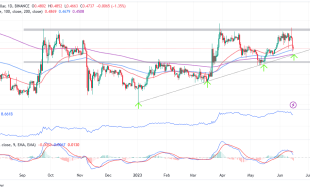Join Our Telegram channel to stay up to date on breaking news coverage
Two U.S. senators are joining forces across the aisle to separate artificial Intelligence (AI) from the rest of the Internet. On June 14, Republican Senator Josh Hawley and Democrat Senator Richard Blumenthal proposed new legislation that, if passed, would exempt AI from Section 230 protections. The proposed bill would allow social media companies to be sued for spreading harmful material created with artificial intelligence. This will throw a spanner in the works for the rising trend of generative AI elements within social apps.
Today @SenBlumenthal and I introduce the first bipartisan AI bill – putting power in the hands of consumers to sue when AI harms them. It’s landmark protection for Americans, and more to come https://t.co/10rJOr5IP3
— Josh Hawley (@HawleyMO) June 14, 2023
The measure, straightforwardly titled “No Section 230 Immunity for AI Act,” comes as the question of who holds accountability for AI’s creations is hotly debated—with no apparent legal answer yet.
In a press statement, Democrat Senator Richard Blumenthal has asserted:
AI companies should be forced to take responsibility for business decisions as they’re developing products—without any Section 230 legal shield.
However, this follows the defeat of two landmark instances at the Supreme Court that would have narrowed the scope of Section 230 immunity last month.
On the other hand, Missouri Republican Hawley has added:
We can’t make the same mistakes with generative AI as we did with Big Tech on Section 230…the companies must be held accountable.
Newly Proposed Legislation
Earlier this week, Blumenthal hinted at his new legislation during a Senate Judiciary Committee hearing on AI’s real-world impact on human rights. During his questioning, Blumenthal claimed social media companies have benefited from an overly broad interpretation of Section 230.
“We need to clarify Section 230 to say it does not apply to AI because if we don’t, we’re in for a whole new world of hurt,” Blumenthal said.
Blumenthal, a Democrat, called the bill a “first step” in establishing safeguards around artificial intelligence as advancement in the technology accelerates and investment soars. The bipartisan support for the proposal points to an area of potential breakthrough after several years of stalled U.S. legislative efforts involving the tech sector.
Section 230 refers to the text found in Title 47 of Communications Decency Act (CDA), which is widely considered the foundational law of the Internet. It enables social media sites, search engines, forums, and comment sections to exist without internet providers taken to task for their users’ content. It notably gives providers immunity from prosecution for illegal content, (provided reasonable efforts are made to remove such content upon discovery).
Will Section 230 Escape Opponent’s Wrath?
Various opponents of Section 230 have alleged that it absolves social media platforms and other online service providers responsibility for their content. In recent years, Section 230 has faced pushback from politicians of both parties—mainly because it shields big tech companies as misinformation proliferates on the Internet.
The Republican lawmakers and some Democrats, have made numerous efforts to scrap the rule entirely. Further, President Joe Biden has repeatedly noted that he wants the regulation ameliorated.
Recently, the Supreme Court opted to keep the provision intact, despite all the flack that Section 230 has been receiving. The Court ruled against changing Section 230 in light of a lawsuit, where plaintiff’s sought to hold social media companies accountable for damages sustained through the platform’s alleged hosting and promotion of terrorist-related content.
According to the Supreme Court, a social media site cannot be held accountable for the suggestions made by the algorithms it uses to surface content any more, than an email or cellular service provider can for the content transmitted via their services.
Further, in a recent Senate hearing, OpenAI CEO Sam Altman told U.S. Sen. Lindsey Graham that it was his impression that Section 230 did not apply to his company. Senator Hawley asked Altman what he thought about a hypothetical situation where Congress “opened the courthouse doors” and allowed people who AI harmed to testify in Court. The CEO responded,” Please forgive my ignorance; can’t people sue us?”
Conclusion
As no specific language covers generative AI in Section 230, further discussions about its relevance to generative AI technologies could narrow down to the definition of “online service.”
It’s a complicated, unresolved issue to determine the future of AI and the Internet. However, if Section 230 applies to generative AI technologies, holding businesses or individuals accountable for harm resulting from misinformation or lousy advice generated via AI might be difficult.
Related News
- OpenAI and ChatGPT investigated by German regulators to determine privacy practices
- New US Bill Will Bring Clarity on SEC and CFTC Jurisdiction Regarding Cryptocurrencies
- Draft GOP Bill Earns Applause from Crypto Chiefs, While Democrats Express Reservations
- Gary Gensler’s Vision for Regulating Crypto Brokers
- SEC Plans to Introduce New AI Rules for Brokers in October
Best Wallet - Diversify Your Crypto Portfolio
- Easy to Use, Feature-Driven Crypto Wallet
- Get Early Access to Upcoming Token ICOs
- Multi-Chain, Multi-Wallet, Non-Custodial
- Now On App Store, Google Play
- Stake To Earn Native Token $BEST
- 250,000+ Monthly Active Users
Join Our Telegram channel to stay up to date on breaking news coverage


